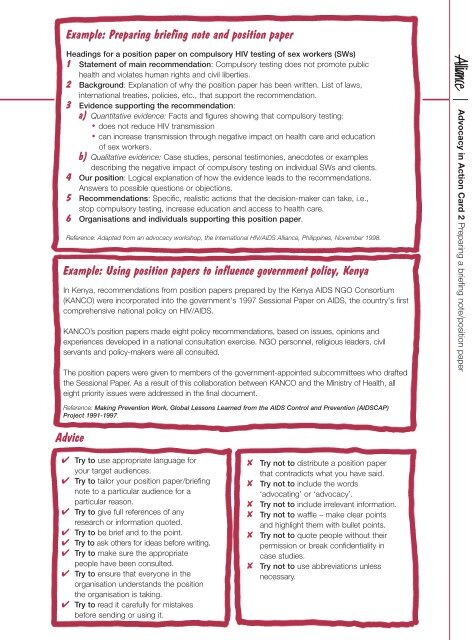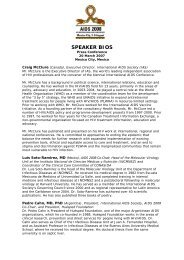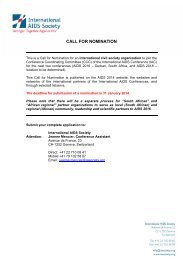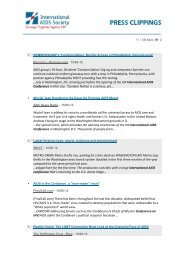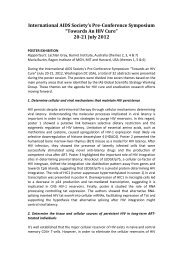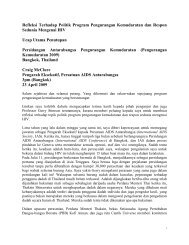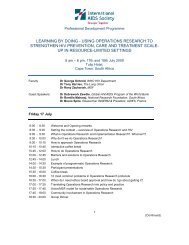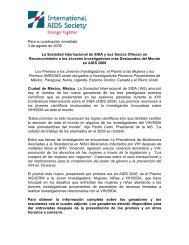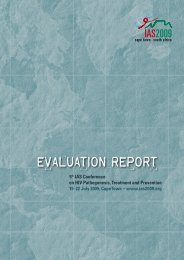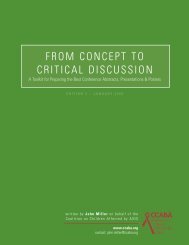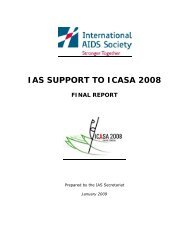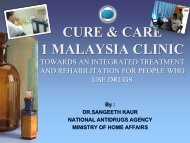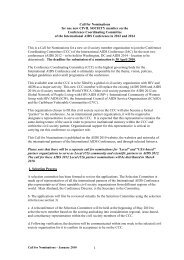Advocacy in Action - International AIDS Society
Advocacy in Action - International AIDS Society
Advocacy in Action - International AIDS Society
Create successful ePaper yourself
Turn your PDF publications into a flip-book with our unique Google optimized e-Paper software.
Example: Prepar<strong>in</strong>g brief<strong>in</strong>g note and position paper<br />
Head<strong>in</strong>gs for a position paper on compulsory HIV test<strong>in</strong>g of sex workers (SWs)<br />
1 Statement of ma<strong>in</strong> recommendation: Compulsory test<strong>in</strong>g does not promote public<br />
health and violates human rights and civil liberties.<br />
2 Background: Explanation of why the position paper has been written. List of laws,<br />
<strong>in</strong>ternational treaties, policies, etc., that support the recommendation.<br />
3 Evidence support<strong>in</strong>g the recommendation:<br />
a) Quantitative evidence: Facts and figures show<strong>in</strong>g that compulsory test<strong>in</strong>g:<br />
• does not reduce HIV transmission<br />
• can <strong>in</strong>crease transmission through negative impact on health care and education<br />
of sex workers.<br />
b) Qualitative evidence: Case studies, personal testimonies, anecdotes or examples<br />
describ<strong>in</strong>g the negative impact of compulsory test<strong>in</strong>g on <strong>in</strong>dividual SWs and clients.<br />
4 Our position: Logical explanation of how the evidence leads to the recommendations.<br />
Answers to possible questions or objections.<br />
5 Recommendations: Specific, realistic actions that the decision-maker can take, i.e.,<br />
stop compulsory test<strong>in</strong>g, <strong>in</strong>crease education and access to health care.<br />
6 Organisations and <strong>in</strong>dividuals support<strong>in</strong>g this position paper.<br />
Reference: Adapted from an advocacy workshop, the <strong>International</strong> HIV/<strong>AIDS</strong> Alliance, Philipp<strong>in</strong>es, November 1998.<br />
Example: Us<strong>in</strong>g position papers to <strong>in</strong>fluence government policy, Kenya<br />
In Kenya, recommendations from position papers prepared by the Kenya <strong>AIDS</strong> NGO Consortium<br />
(KANCO) were <strong>in</strong>corporated <strong>in</strong>to the government's 1997 Sessional Paper on <strong>AIDS</strong>, the country's first<br />
comprehensive national policy on HIV/<strong>AIDS</strong>.<br />
KANCO’s position papers made eight policy recommendations, based on issues, op<strong>in</strong>ions and<br />
experiences developed <strong>in</strong> a national consultation exercise. NGO personnel, religious leaders, civil<br />
servants and policy-makers were all consulted.<br />
The position papers were given to members of the government-appo<strong>in</strong>ted subcommittees who drafted<br />
the Sessional Paper. As a result of this collaboration between KANCO and the M<strong>in</strong>istry of Health, all<br />
eight priority issues were addressed <strong>in</strong> the f<strong>in</strong>al document.<br />
<strong>Advocacy</strong> <strong>in</strong> <strong>Action</strong> Card 2 Prepar<strong>in</strong>g a brief<strong>in</strong>g note/position paper<br />
Reference: Mak<strong>in</strong>g Prevention Work, Global Lessons Learned from the <strong>AIDS</strong> Control and Prevention (<strong>AIDS</strong>CAP)<br />
Project 1991-1997.<br />
Advice<br />
✔ Try to use appropriate language for<br />
your target audiences.<br />
✔ Try to tailor your position paper/brief<strong>in</strong>g<br />
note to a particular audience for a<br />
particular reason.<br />
✔ Try to give full references of any<br />
research or <strong>in</strong>formation quoted.<br />
✔ Try to be brief and to the po<strong>in</strong>t.<br />
✔ Try to ask others for ideas before writ<strong>in</strong>g.<br />
✔ Try to make sure the appropriate<br />
people have been consulted.<br />
✔ Try to ensure that everyone <strong>in</strong> the<br />
organisation understands the position<br />
the organisation is tak<strong>in</strong>g.<br />
✔ Try to read it carefully for mistakes<br />
before send<strong>in</strong>g or us<strong>in</strong>g it.<br />
✘ Try not to distribute a position paper<br />
that contradicts what you have said.<br />
✘ Try not to <strong>in</strong>clude the words<br />
‘advocat<strong>in</strong>g’ or ‘advocacy’.<br />
✘ Try not to <strong>in</strong>clude irrelevant <strong>in</strong>formation.<br />
✘ Try not to waffle – make clear po<strong>in</strong>ts<br />
and highlight them with bullet po<strong>in</strong>ts.<br />
✘ Try not to quote people without their<br />
permission or break confidentiality <strong>in</strong><br />
case studies.<br />
✘ Try not to use abbreviations unless<br />
necessary.


